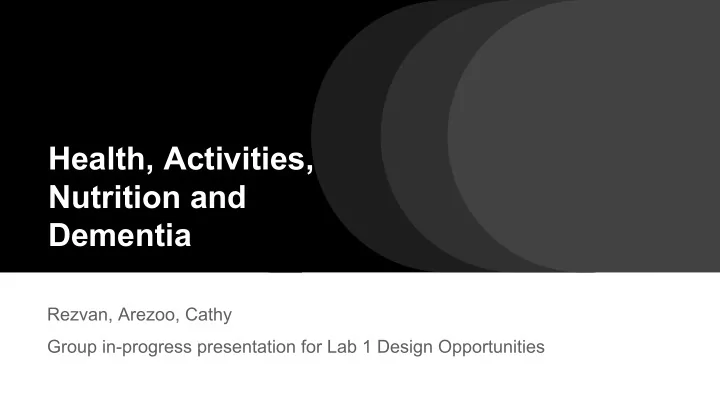

Health, Activities, Nutrition and Dementia Rezvan, Arezoo, Cathy Group in-progress presentation for Lab 1 Design Opportunities
Related Theory Our Statement The (Where we are now) Nov. 14th 2016 Design Spiral 1) Introduction 2) Brief literature review ● Problem ● Interaction or Observation 3) Methods ● Understanding model 4) Results and discussions ● Design and investigation 5) Conclusion ● Evaluation
Introduction a. Background for problem Lack of proper nutrition is one of the main issues in the geriatric population in compparision with younger generation. ● Dementia is an overall term that describes a wide range of symptoms associated with a decline in memory or other thinking skills severe enough to reduce a person's ability to perform everyday activities. (alzheimer's association) ● There are researches that connect physical activity, nutrition and Dementia.
Introduction b. Description of problem ● Deficiency in nutrition specially in individuals who are old can have correational relation with incident of dementia or incline in body and brain function of population with dementia. ● Lack of physical exersice can have an impact on brain function, body function, heart health, and mental health of individuals who are old specially those with or at risk of dementia. The best current evidence suggests that heart-healthy ● eating patterns, such as the Mediterranean diet, also may help protect the brain and memory function.
Introduction c. Purpose of project This Group activity tries to build on what exists and design a ● package that includes engaging activities for Individuals who are old and have dementia or are at the risk of it, physically and mentally. This package also consist program that monitors their daily nutrition intake. What can be beneficial in this case is to work on a food production or program that is nutritionally rich for this population.
Introduction d. Objective or questions ● Is there any evidence based causal or correlational relationship between dementia and nutrition, exercise, and engaging activities? What kind of exercise and activity can be more effective in regard of improving or at least slowing down the ● decline in physical function of this population? What Kind of activity can be designed to improve their physical functioning as well as their well-being? ● ● Can nutrition be effective on slowing down the process of incline in memory?
Introduction e. Scope and limitations of project ● In a research process and working with individual who are old with dementia the ethics can be a quite big concern and an obstacle for employing some methods (observation as an example!). ● Individuals who are old with demetia are at higher risk for behavioural disturbances. This can cause that participants change their mind in the middle of process. ● Ongoing consent is another concern in this regard, participant may change their mind about data that is collected.
Brief Literature review Gray GE, Nutrition and dementia, Journal of the American Dietetic Association, 1989, 89(12):1795-1802 Wilcox, S. et al. "Perceptions And Beliefs About The Role Of Physical Activity And Nutrition On Brain Health In Older Adults". The Gerontologist 49.S1 (2009): S61-S71. Web. Chung, J. C. C. "Activity Participation And Well-Being Of People With Dementia In Long-Term--Care Settings". OTJR: Occupation, Participation and Health 24.1 (2004): 22-31. Web. Tombini, Mario et al. "Nutritional Status Of Patients With Alzheimer’S Disease And Their Caregivers". Journal of Alzheimer's Disease 54.4 (2016): 1619-1627. Web.
Brief Literature review Beard, R. L. (2011). Art therapies and dementia care: A systematic review. Dementia, 11(5), 633-656. doi:10.1177/1471301211421090 Lyketsos, C. G., Steinberg, M., Breitner, J. C., Tschanz, J. T., Norton, M., & Steffens, D. C. (2000). Mental and behavioral disturbances in dementia: Findings from the cache county study on memory in aging. Neurobiology of Aging, 21, 244. doi:10.1016/s0197-4580(00)83436-3 Espinel, C. (1996). De Kooning's late colours and forms: Dementia, creativity, and the healing power of art. The Lancet, 347(9008), 1096-1098. doi:10.1016/s0140-6736(96)90285-8 Iida, M., Shrout, P., Laurenceau, J. P., & Bolger, N. (2012). Using diary methods in psychological research. In H. Cooper (Ed.), APA handbook of research methods in psychology: Foundations, planning, measures and psychometrics. (Vol. 1, pp. 277-305). Washington, D.C.: American Psychological Association.
Methods Expert Interview → Delphi Method Observation Probe
Expert interview 1 1. Is there any evidence based causal or correlational relationship between dementia and nutrition, exercise, and engaging activities? 2. Is there any reversible component in Dementia? If so can any of them be improved with nutrition? 3. Can nutrition be effective on slowing down the process of incline in memory? 4. Is nutrition beneficial for comorbid behavioral disturbances of dementia? (Depression, Delusion) 5. To what extent exercise can be beneficial in improvement of body function? If not to what extent, it can decrease or slow down decline in body function?
Expert interview 2 6. Can artistic and creative activities improve brain function or at least slow down the decline in memory function? 7. Is there any evidence based role for artistic and or creative engaging activities in decreasing the chances of prevalence comorbid behavioral disturbances in dementia including depression, delusion, illusion, etc? 8. How feelings of enjoyment, happiness, and wellbeing can affect the process of dementia? 9. Are there any specific nutritional and exercise activities (evidence based) that people with dementia are encouraged to follow? 10. At what stage of dementia is the capacity of patients to make their own decisions becomes a question and how is it answered?
Your Thoughts Why do you think we’ve chosen these 3 methods? What could be the expected outcome of each method?
Thank you!
Recommend
More recommend